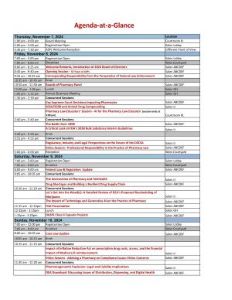Back
The Battle over 340B: How Drug Manufacturer Restrictions and Recent Court Decisions are Re-Shaping 340B Drug Distribution and Delivery Models
Friday, November 8, 2024
2:40 PM – 3:40 PM MT
Location: Salon ABCDEF
CE: 1

Marty Allain, JD
CEO
REAL Solutions Group LLC
Westfield, Indiana, United States
Alan J. Arville, BA, Juris Doctor
Partner
Epstein Becker & Green, P.C.
Chicago, Illinois, United States
Primary Presenter(s)
Co-Presenter(s)
Pharmaceutical manufacturers continue to restrict the delivery of 340B drug discounts to contract pharmacies in response to the growth of 340B sales, perceived non-compliance with 340B program requirements, and statutory interpretation. These restrictions have a significant financial impact on hospitals, health centers, and other health care providers that participate as “covered entities” in the 340B program. In response, covered entities and contract pharmacies have started to explore new avenues to secure and dispense 340B drugs. These novel approaches include systems standing up wholesale drug distribution operations and modifications to their terms with contract pharmacies. With these changes come new operational challenges including accreditation requirements for distributor licensure, co-locating pharmacy and distributor operations, how to comply with DSCSA and, potentially, increased board scrutiny. Our presentation will discuss how these approaches are working in practice, what’s next at the state and federal level in response to the issue, and the current state of litigation around the topic. This presentation will also cover other “hot topics” with respect to 340B contract pharmacy arrangements, including the impact of the U.S. District Court Decision, Genesis vs. Becerra, rejecting a restrictive interpretation of “patient” under the 340B program.
Learning Objectives:
- Describe the impact of court decisions on 340B manufacturer restrictions and patient eligibility on contract pharmacy arrangements.
- Identify and understand potential Federal and state law requirements for implementing an alternative distribution model, including the intersection of 340B and DSCSA.
- Identify and understand licensing and accreditation requirements for alternative distribution models.
- Describe business reasons outside of 340B for covered entities to implement alternative distribution models.

